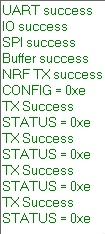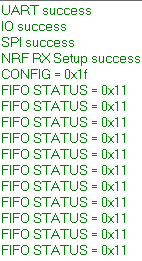I've been scratching my head for a few days over getting the NRF24L01+ modules to work on AVRs (ATMega328/p). I followed Gizmosnack's tutorial, not changing very much at all from his code. I've also tried a couple libraries but some didn't compile, some compiled but didn't work. I read quite a few Stackexchange posts as well but none seem to help.
I've got UART debugging going on, and the transmitter shows this:
Which claims TX success, but I'm skeptical since the IRQ pin doesn't show any activity even though those CONFIG bits shouldn't be masking the TX_DS interrupt.
The receiver shows this:
Which claims both FIFOs are empty, which seems correct. So I'm able to communicate with each NRF over SPI just fine, but I've gotten no semblance of wireless communication working.
Both Atmel Studio projects have F_CPU as a Defined Symbol (F_CPU = 8000000UL)
Transmitter Code
#include <avr/io.h>
#include <stdio.h>
#include <util/delay.h>
#include <avr/interrupt.h>
#include "nrf24l01.h"
#include "my_usartlib.h"
void initSPI();
uint8_t writeByteSPI(uint8_t);
uint8_t readReg(uint8_t);
void writeReg(uint8_t, uint8_t);
uint8_t *readRegArray(uint8_t, uint8_t *data, uint8_t);
void nrf24l01_init();
void nrf_transmit(uint8_t * W_buff);
void reset_IRQ();
uint8_t rx_address[] = {0x12, 0x12, 0x12, 0x12, 0x12};
uint8_t tx_address[] = {0x12, 0x12, 0x12, 0x12, 0x12};
volatile uint8_t tx_flag = 0x00;
uint8_t tx_buffer[5];
int main(void){
usart_init();
usart_tx_string("UART success\n");
DDRD |= (1<<6); //D6 (LED) input
DDRD &= ~(1<<2); //D2 (INT0) input
usart_tx_string("IO success\n");
initSPI();
usart_tx_string("SPI success\n");
for(int i = 0; i < 5; i++){
tx_buffer[i] = 2*i;
}
usart_tx_string("Buffer success\n");
nrf24l01_init();
usart_tx_string("NRF TX success\n");
PORTD |= (1<<6);
_delay_ms(500);
PORTD &= ~(1<<6);
_delay_ms(500); //flash LED to denote success
EICRA |= (1<<ISC01); //Falling edge detect
EIMSK |= (1<<INT0);
tx_buffer[0] = 0x10;
tx_buffer[1] = 0x20;
tx_buffer[2] = 0x30;
usart_tx_string("CONFIG = 0x");
usart_tx_val(readReg(CONFIG), 16); usart_tx('\n');
sei();
while (1) {
_delay_ms(2000);
nrf_transmit(tx_buffer);
if((readReg(STATUS) & (1<<4)) != 0){
usart_tx_string("TX Failure\n");
} else{
usart_tx_string("TX Success\n");
}
usart_tx_string("STATUS = 0x");
usart_tx_val(readReg(STATUS), 16); usart_tx('\n');
reset_IRQ();
}
}
void initSPI(){
DDRB |= (1<<DDB5) | (1<<DDB3) | (1<<DDB2) | (1<<DDB1);
SPCR |= (1<<SPE) | (1<<MSTR);
PORTB |= (1 << 2); // CSN High
PORTB &= ~(1 << 1); // CE low
}
uint8_t writeByteSPI(uint8_t cData){
SPDR = cData;
while(!(SPSR & (1<<SPIF)));
return SPDR;
}
uint8_t readReg(uint8_t reg){
_delay_us(10);
PORTB &= ~(1 << 2);
_delay_us(10);
writeByteSPI(R_REGISTER + reg);
_delay_us(10);
reg = writeByteSPI(NOP);
_delay_us(10);
PORTB |= (1 << 2);
return reg;
}
void writeReg(uint8_t reg, uint8_t data){
_delay_us(10);
PORTB &= ~(1 << 2);
_delay_us(10);
writeByteSPI(W_REGISTER + reg);
_delay_us(10);
writeByteSPI(data);
_delay_us(10);
PORTB |= (1 << 2);
}
void writeRegArray(uint8_t reg, uint8_t *data, uint8_t data_length){
_delay_us(10);
PORTB &= ~(1 << 2);
_delay_us(10);
writeByteSPI(W_REGISTER + reg);
_delay_us(10);
for(int i = 0; i < data_length; i++){
writeByteSPI(data[i]);
_delay_us(10);
}
PORTB |= (1 << 2);
}
uint8_t *readRegArray(uint8_t reg, uint8_t *data, uint8_t data_length){
static uint8_t ret[32];
_delay_us(10);
PORTB &= ~(1 << 2);
_delay_us(10);
writeByteSPI(reg);
_delay_us(10);
for(int i = 0; i < data_length; i++){
ret[i] = writeByteSPI(NOP);
_delay_us(10);
}
PORTB |= (1 << 2);
return ret;
}
void nrf24l01_init(){
_delay_ms(100);
writeReg(EN_AA, 0x01); //enable auto-ack
writeReg(SETUP_RETR, 0x2F); //15 retries at 750us for EN_AA
writeReg(EN_RXADDR, 0x01); //enable data pipe 0
writeReg(SETUP_AW, 0x03); //5 bytes of rx address
writeReg(RF_CH, 0x01); //2.401GHz frequency
writeReg(RF_SETUP, 0x07); //power and range modes
writeRegArray(RX_ADDR_P0, rx_address, 5);
writeRegArray(TX_ADDR, tx_address, 5);
writeReg(RX_PW_P0, 5); //5 byte payload width
writeReg(CONFIG, 0x0E); //bits 3, 2, 1 (transmitter)
_delay_ms(100);
}
void nrf_transmit(uint8_t * W_buff){
writeRegArray(FLUSH_TX, W_buff, 0);
writeRegArray(W_TX_PAYLOAD, W_buff, 5);
_delay_ms(10);
PORTB |= (1 << 1); //CE high, transmit data
_delay_us(20);
PORTB &= ~(1 << 1); //CE low, stop transmitting
_delay_ms(10);
}
void reset_IRQ(void){
writeReg(STATUS, 0x70);
}
ISR(INT0_vect){
usart_tx_string("IRQ triggered\n");
}
Receiver Code
#include <avr/io.h>
#include <stdio.h>
#include <util/delay.h>
#include <avr/interrupt.h>
#include "nrf24l01.h"
#include "my_usartlib.h"
void initSPI();
uint8_t writeByteSPI(uint8_t);
uint8_t readReg(uint8_t);
void writeReg(uint8_t, uint8_t);
uint8_t *readRegArray(uint8_t, uint8_t *data, uint8_t);
void nrf24l01_init();
void nrf_transmit(uint8_t * W_buff);
void reset_IRQ();
uint8_t rx_address[] = {0x12, 0x12, 0x12, 0x12, 0x12};
uint8_t tx_address[] = {0x12, 0x12, 0x12, 0x12, 0x12};
uint8_t* rx_buffer;
volatile uint8_t rx_flag = 0x00;
int main(void){
usart_init();
usart_tx_string("UART success\n");
DDRD |= (1<<6); //D6 (LED) output
DDRD &= ~(1<<2); //D2 (INT0) input
usart_tx_string("IO success\n");
initSPI();
usart_tx_string("SPI success\n");
nrf24l01_init();
usart_tx_string("NRF RX Setup success\n");
_delay_ms(200);
PORTD |= (1<<6);
_delay_ms(200);
PORTD &= ~(1<<6);
_delay_ms(200); //flash LED to denote success
EICRA |= (1<<ISC01); //Falling edge detect
EIMSK |= (1<<INT0);
usart_tx_string("CONFIG = 0x");
usart_tx_val(readReg(CONFIG), 16); usart_tx('\n');
sei();
PORTB |= (1 << 1); //CE high, start listening
while (1) {
if(rx_flag){
PORTB &= ~(1<<1); //stop listening
rx_flag = 0x00;
for(int i = 0; i < 5; i++){
usart_tx_val(rx_buffer[i], 16);
usart_tx(',');
}
usart_tx('\n');
PORTD |= (1<<6);
_delay_ms(2000);
PORTD &= ~(1<<6);
_delay_ms(2000); //LED ON for 2s, wait for 2s
PORTB |= (1<<1); //start listening again
reset_IRQ();
}
_delay_ms(1000);
usart_tx_string("FIFO STATUS = 0x");
usart_tx_val(readReg(FIFO_STATUS), 16); usart_tx('\n');
}
}
void initSPI(){
DDRB |= (1<<DDB5) | (1<<DDB3) | (1<<DDB2) | (1<<DDB1);
SPCR |= (1<<SPE) | (1<<MSTR);
PORTB |= (1 << 2); // CSN High
PORTB &= ~(1 << 1); // CE low
}
uint8_t writeByteSPI(uint8_t cData){
SPDR = cData;
while(!(SPSR & (1<<SPIF)));
return SPDR;
}
uint8_t readReg(uint8_t reg){
_delay_us(10);
PORTB &= ~(1 << 2);
_delay_us(10);
writeByteSPI(R_REGISTER + reg);
_delay_us(10);
reg = writeByteSPI(NOP);
_delay_us(10);
PORTB |= (1 << 2);
return reg;
}
void writeReg(uint8_t reg, uint8_t data){
_delay_us(10);
PORTB &= ~(1 << 2);
_delay_us(10);
writeByteSPI(W_REGISTER + reg);
_delay_us(10);
writeByteSPI(data);
_delay_us(10);
PORTB |= (1 << 2);
}
void writeRegArray(uint8_t reg, uint8_t *data, uint8_t data_length){
_delay_us(10);
PORTB &= ~(1 << 2);
_delay_us(10);
writeByteSPI(W_REGISTER + reg);
_delay_us(10);
for(int i = 0; i < data_length; i++){
writeByteSPI(data[i]);
_delay_us(10);
}
PORTB |= (1 << 2);
}
uint8_t *readRegArray(uint8_t reg, uint8_t *data, uint8_t data_length){
static uint8_t ret[32];
_delay_us(10);
PORTB &= ~(1 << 2);
_delay_us(10);
writeByteSPI(reg);
_delay_us(10);
for(int i = 0; i < data_length; i++){
ret[i] = writeByteSPI(NOP);
_delay_us(10);
}
PORTB |= (1 << 2);
return ret;
}
void nrf24l01_init(){
_delay_ms(100);
writeReg(EN_AA, 0x01); //enable auto-ack
writeReg(SETUP_RETR, 0x2F); //15 retries at 750us for EN_AA
writeReg(EN_RXADDR, 0x01); //enable data pipe 0
writeReg(SETUP_AW, 0x03); //5 bytes of rx address
writeReg(RF_CH, 0x01); //2.401GHz frequency
writeReg(RF_SETUP, 0x07); //power and range modes
writeRegArray(RX_ADDR_P0, rx_address, 5);
writeRegArray(TX_ADDR, tx_address, 5);
writeReg(RX_PW_P0, 5); //5 byte payload width
writeReg(CONFIG, 0x1F); //bits 4, 3, 2, 1, 0 (receiver)
_delay_ms(100);
}
void reset_IRQ(void){
writeReg(STATUS, 0x70);
}
ISR(INT0_vect){
PORTB &= ~(1 << 1);
rx_buffer = readRegArray(R_RX_PAYLOAD, rx_buffer, 5);
rx_flag = 0xFF;
reset_IRQ();
}
Hardware
I've got them connected up to 3.3V Arduino Pro Mini's, one powered with a CP2102 module with the 3.3V trace problem fixed (I've cut the trace, oscilloscope confirms 3.299V on average under load) and the other with an STLink V2 USB Dongle (it was the only other easy 3.3V source around)
I've confirmed on an oscilloscope that the IRQ pin doesn't change. Pin connections are all just on a breadboard, LEDs (w/ 400ohms) on PD6 for each. I have a 100uF, 25V electrolytic capacitor on each power rail, and I didn't notice any significant voltage dips on the oscilloscope.
Fuses read E2 D9 07 (brownout disabled, 8Mhz internal)
I'm quite lost here, so any help is appreciated


